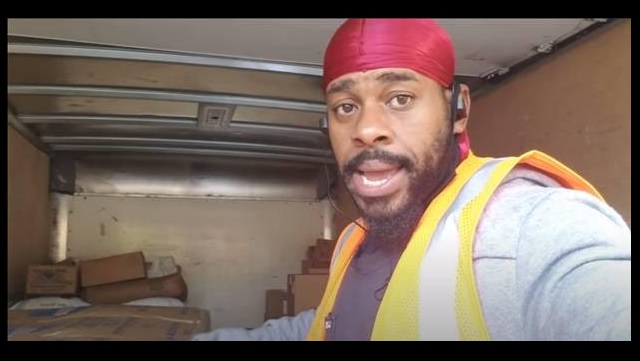A Black Deliveryman Tells Why He’s Voting for Trump [VIDEO]

Watch Lamb explain why Trump’s election gave him hope for the first time in his life.
One of Pool’s followers is a former Uber driver named Gary Lamb. Having faced enormous hurdles in his life, Lamb uploaded a viral video in which he thanks Pool for opening his eyes to how a half-century of Democrat social policies have virtually destroyed America’s inner cities, and how Trump is keeping his promise to make things better for the African American community.
Lamb’s personal story lets those of us who’ve had an easier time in life better understand what it’s like struggling to eke out a living on the other side of the tracks. In my view, Gary Lamb is a genuine American hero, a 39-year-old man who has consistently rejected the quick money that comes from a life of crime, and instead is working long hours as a delivery driver to support himself and his family.
What he has to say in his 9-minute video could be an indication that a massive, under-the-radar Trump surge is in the making. Internal polls by both presidential campaigns show an accelerating shift among black male voters away from Biden and toward Trump.
Watch Lamb explain why Trump’s election gave him hope for the first time in his life, and then scroll down to see how the president accused of being a racist has kept his promise to reach out to the African American community.
Is Trump a racist? You decide.
It’s next to impossible to turn on the TV without seeing another unsubstantiated allegation that Trump is a racist. His remarkable outreach to the African American community puts a lie to that slanderous narrative.
- In 2018, President Trump signed a clemency plea for an African American grandmother who had served 22 years of a life sentence for a nonviolent drug offense. Hollywood celebrity Kim Kardashian brought Alice Marie Johnson’s plight to the attention of President Trump, who ordered her set free. “I felt like I was losing hope. Thank you, President Trump. I love you and I am going to make you proud that you gave me this second chance in life.” Not everyone was thrilled that Trump set Johnson free. HBO host Bill Maher said he fears that “grateful black folks” like Alice Johnson will cause Trump to rise in the polls.
- Citing racial injustice, President Trump posthumously pardoned black boxing legend Jack Johnson. In 1913, the first black heavyweight champion was convicted by an all-white jury for taking his white girlfriend across state lines for “immoral purposes.” The conviction and imprisonment destroyed Johnson’s boxing career. With Sylvester Stallone and former heavyweight champion Lenox Lewis at his side, President Trump signed the pardon in an Oval Office ceremony. Previous presidents, including George W. Bush and Barack Obama, rejected bipartisan requests to grant clemency to Johnson.
- In 2018, President Trump signed a bill elevating the birthplace of Martin Luther King, Jr. to full national park status. With the slain civil rights leader’s niece, Alveda King, looking on, Trump signed the bill aboard Air Force One. The legislation gives the landmark attraction additional resources, including park rangers and funding for community improvements. Previously turned down by presidents George W. Bush and Barack Obama, the long championed bill was sponsored by the late civil rights icon Rep. John Lewis (D-Ga.).
- President Trump is considering pardoning Muhammad Ali. The former heavyweight boxing sensation was sentenced in 1970 to five years in prison after he was convicted of draft evasion. As a conscientious objector to the Vietnam War, Ali refused to serve in the military. The prison sentence was overturned in 1971 in a unanimous Supreme Court decision that found that the Department of Justice had improperly told the draft board that Ali’s stance wasn’t motivated by his religious beliefs.
- A month after taking office, President Trump signed an executive order that Historically Black Colleges and Universities will be a priority in his administration. As one of more than 100 black educators who attended the signing ceremony, Leonard Haynes, former executive director of the 40-year-old White House Initiative on Historically Black Colleges and Universities, said, “Oh man. I’ve been around for a long time and I’ve never seen as many black folks in the Oval Office.” In December 2019, Trump kept his promise by signing legislation that permanently allocates $250 million a year to HBCUs.
- In January 2018, President Trump extended an olive branch to the NFL kneelers by asking them to send him the names of black Americans they feel were unfairly treated by the criminal justice system, promising to have his administration review such cases and take remedial action if warranted. In December 2019, Trump signed the First Step Act, bi-partisan legislation that marked the first major prison reform in years.
- In May 2018, African American NYPD detective Miosotis Familia, mother of two, was gunned down by a cop-hater. At a memorial service in the nation’s capital, President Trump hugged, kissed, and held hands with Familia’s 90-year-old mother. Would a racist ever do such a thing?
Democrats know that Trump is not a racist. But because the “race card” has long been an effective way to incite racial hatred against Republican presidents, they continue to target him with racial invective. Fortunately, black voters like Gary Lamb are wising up to how Democrats use the race card to distract the black electorate from the real problems that have plagued America’s Democrat-run inner cities for the last half-century.
©John Edison. All rights reserved.


Leave a Reply
Want to join the discussion?Feel free to contribute!